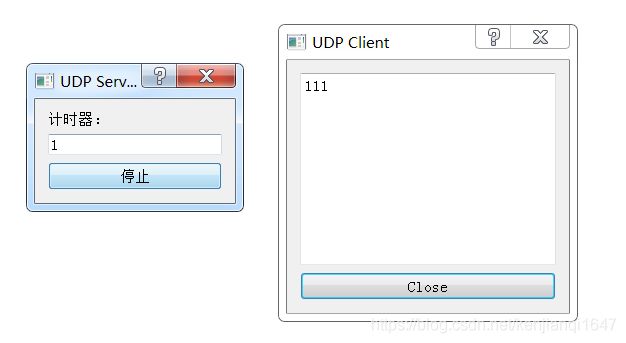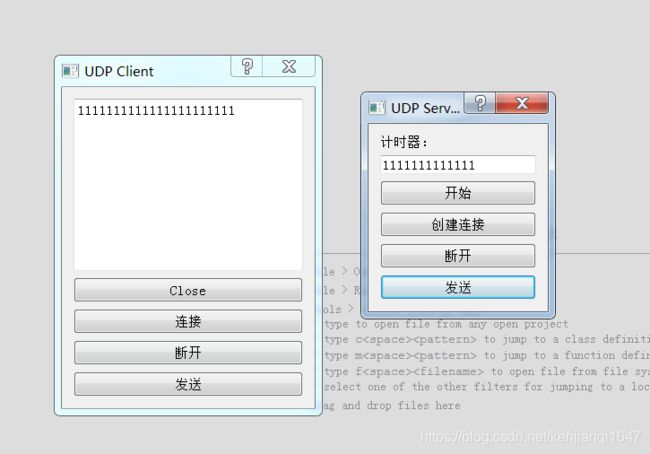QT学习笔记16(网络通信)
一、获取本机网络信息
获取本机的主机名、IP地址和硬件地址等网络信息。
(1)编写界面
#ifndef NETWORKINFORMATION_H
#define NETWORKINFORMATION_H
#include
#include
#include
#include
#include
#include
#include
#include
class NetworkInformation : public QWidget
{
Q_OBJECT
public:
NetworkInformation(QWidget *parent = 0);
~NetworkInformation();
void getHostInformation();
public slots:
void slotDetail();
private:
QLabel *hostLabel;
QLineEdit *LineEditLocalHostName;
QLabel *ipLabel;
QLineEdit *LineEditAddress;
QPushButton *detailBtn;
QGridLayout *mainLayout;
};
#endif // NETWORKINFORMATION_H (2)编写.cpp文件,获取并显示网络接口信息
#include "networkinformation.h"
NetworkInformation::NetworkInformation(QWidget *parent)
: QWidget(parent)
{
hostLabel = new QLabel(tr("主机名:"));
LineEditLocalHostName = new QLineEdit;
ipLabel = new QLabel(tr("IP 地址:"));
LineEditAddress = new QLineEdit;
detailBtn = new QPushButton(tr("详细"));
mainLayout = new QGridLayout(this);
mainLayout->addWidget(hostLabel,0,0);
mainLayout->addWidget(LineEditLocalHostName,0,1);
mainLayout->addWidget(ipLabel,1,0);
mainLayout->addWidget(LineEditAddress,1,1);
mainLayout->addWidget(detailBtn,2,0,1,2);
getHostInformation();
connect(detailBtn,SIGNAL(clicked()),this,SLOT(slotDetail()));
}
void NetworkInformation::getHostInformation()
{
QString localHostName = QHostInfo::localHostName();//获得本机主机名
LineEditLocalHostName->setText(localHostName);//显示主机名
QHostInfo hostInfo = QHostInfo::fromName(localHostName);//根据主机名获得相关主机信息,包括IP地址等
//获得主机的IP地址列表
QList listAddress = hostInfo.addresses();
if(!listAddress.isEmpty()) //获得主机的ip地址列表可能为空
{
LineEditAddress->setText(listAddress.at(2).toString());//主机IP地址不为空显示第一个IP地址
}
}
//显示主机网卡的详细信息
void NetworkInformation::slotDetail()
{
QString detail="";
QList list=QNetworkInterface::allInterfaces();
//提供了主机IP地址和网络接口列表
for(int i=0;i entryList=interface.addressEntries();
//(d)显示子网掩码和广播地址等信息
for(int j=1;j 二、Qt UDP通信
1、Qt实现UDP广播通信
服务器端:
(1).h文件设计
#ifndef UDPSERVER_H
#define UDPSERVER_H
#include
#include
#include
#include
#include
#include
#include
class UdpServer : public QDialog
{
Q_OBJECT
public:
UdpServer(QWidget *parent = 0,Qt::WindowFlags f=0);
~UdpServer();
public slots:
void StartBtnClicked();
void timeout();
private:
QLabel *TimerLabel;
QLineEdit *TextLineEdit;
QPushButton *StartBtn;
QVBoxLayout *mainLayout;
int port;
bool isStarted;
QUdpSocket *udpSocket;
QTimer *timer;
};
#endif // UDPSERVER_H (2)编写.cpp文件
#include "udpserver.h"
#include
UdpServer::UdpServer(QWidget *parent,Qt::WindowFlags f)
: QDialog(parent,f)
{
setWindowTitle(tr("UDP Server")); //设置窗体的标题
/* 初始化各个控件 */
TimerLabel = new QLabel(tr("计时器:"),this);
TextLineEdit = new QLineEdit(this);
StartBtn = new QPushButton(tr("开始"),this);
/* 设置布局 */
mainLayout = new QVBoxLayout(this);
mainLayout->addWidget(TimerLabel);
mainLayout->addWidget(TextLineEdit);
mainLayout->addWidget(StartBtn);
connect(StartBtn,SIGNAL(clicked()),this,SLOT(StartBtnClicked()));
port = 5555; //设置UDP的端口号参数,服务器定时向此端口发送广播信息
isStarted = false;
udpSocket = new QUdpSocket(this);
timer = new QTimer(this); //创建一个QUdpSocket
//定时发送广播信息
connect(timer,SIGNAL(timeout()),this,SLOT(timeout()));
}
//开始发送数据槽函数
void UdpServer::StartBtnClicked()
{
if(!isStarted)
{
StartBtn->setText(tr("停止"));
timer->start(1000);//定时1s
isStarted =true;
}
else
{
StartBtn->setText(tr("开始"));
isStarted = false;
timer->stop();
}
}
//定时器相应槽函数
void UdpServer::timeout()
{
QString msg = TextLineEdit->text();//获取待发送数据
int length=0;
if(msg=="")
{
return;
}
if((length=udpSocket->writeDatagram(msg.toLatin1(),
msg.length(),QHostAddress::Broadcast,port))!=msg.length())//发送待发送数据
{
return;
}
}
UdpServer::~UdpServer()
{
}
客户端编写:
(1)编写.h文件
#ifndef UDPCLIENT_H
#define UDPCLIENT_H
#include
#include
#include
#include
#include
class UdpClient : public QDialog
{
Q_OBJECT
public:
UdpClient(QWidget *parent = 0,Qt::WindowFlags f=0);
~UdpClient();
public slots:
void CloseBtnClicked();
void dataReceived();
private:
QTextEdit *ReceiveTextEdit;
QPushButton *CloseBtn;
QVBoxLayout *mainLayout;
int port;
QUdpSocket *udpSocket;
};
#endif // UDPCLIENT_H
(2)编写.CPP文件,接收显示数据
#include "udpclient.h"
#include
#include
UdpClient::UdpClient(QWidget *parent,Qt::WindowFlags f)
: QDialog(parent,f)
{
setWindowTitle(tr("UDP Client")); //设置窗体的标题
/* 初始化各个控件 */
ReceiveTextEdit = new QTextEdit(this);
CloseBtn = new QPushButton(tr("Close"),this);
/* 设置布局 */
mainLayout=new QVBoxLayout(this);
mainLayout->addWidget(ReceiveTextEdit);
mainLayout->addWidget(CloseBtn);
connect(CloseBtn,SIGNAL(clicked()),this,SLOT(CloseBtnClicked()));
port =5555; //设置UDP的端口号参数,指定在此端口上监听数据
udpSocket = new QUdpSocket(this); //创建一个QUdpSocket
connect(udpSocket,SIGNAL(readyRead()),this,SLOT(dataReceived()));
//QUdpSocket是一个IO设备,当有数据到达I/O设备时,发送readyRead()信号
bool result=udpSocket->bind(port); //绑定到指定的端口上
if(!result)
{
QMessageBox::information(this,tr("error"),tr("udp socket create error!"));
return;
}
}
void UdpClient::CloseBtnClicked()
{
close();
}
void UdpClient::dataReceived()
{
while(udpSocket->hasPendingDatagrams())//判断是否有数据可读
{
QByteArray datagram;
datagram.resize(udpSocket->pendingDatagramSize());
udpSocket->readDatagram(datagram.data(),datagram.size());
//实现读取第一个数据报,datagram.size()是数据报的长度
QString msg=datagram.data();
ReceiveTextEdit->insertPlainText(msg); //显示数据内容
}
}
UdpClient::~UdpClient()
{
}
测试效果:
三、Qt TCP通信
TCP通信流程,首先启动服务器,然后启动客户端,客户端与服务器经过三次握手之后建立连接。Qt中通过QTcpSocket类和QTcpServer类实现TCP协议的编程。
服务端:
连接流程:
- 创建QTcpServer对象
- 启动服务器(监听)调用成员方法listen(QHostAddress::Any,端口号)
- 当有客户端链接时候会发送newConnection信号,触发槽函数接受链接(得到一个与客户端通信的套接字QTcpSocket)
- QTcpsocket发送数据用成员方法write
- 读数据当客户端有数据来,QTcpSocket对象就会发送readyRead信号,关联槽函数读取数据
1、新建工程,Qt应用程序默认没有加QtNetwork库,手动添加QtNetwork库
在工程的pro文件中添加:QT += network
2、 tcpclientsoket.h中声明需要的控件
tcpserver.cpp构造函数设计界面
客户端:
连接流程:
- 创建QTcpSocket对象
- 链接服务器connectToHost(QHostAddress("ip"),端口号)
- QTcpsocket发送数据用成员方法write
- 读数据当对方有数据来,QTcpSocket对象就会发送readyRead信号,关联槽函数读取数据
1、.pro文件添加network
2、创建QTcpSocket对象
tcpSocket=new QTcpSocket();//创建QTcpSocket套接字对象3、链接服务器connectToHost(QHostAddress("ip"),端口号)
QString localHostName = QHostInfo::localHostName();//获得本机主机名
QHostInfo hostInfo = QHostInfo::fromName(localHostName);//根据主机名获得相关主机信息,包括IP地址等
QList listAddress = hostInfo.addresses(); //获得主机的IP地址列表
tcpSocket->connectToHost(listAddress.at(2).toString(),port);//连接服务器 端口号与要连接的服务端一致 4、发送数据
tcpSocket->write("1");5、接收数据
connect(tcpSocket, &QTcpSocket::readyRead,this,&UdpClient::ReadTcpData);//连接tcp数据接收
//接收主机发来的数据
void UdpClient::ReadTcpData()
{
QByteArray buffer;
//读取缓冲区数据
buffer = tcpSocket->readAll();
if(!buffer.isEmpty())
{
ReceiveTextEdit->insertPlainText(buffer);
}
}测试效果:



